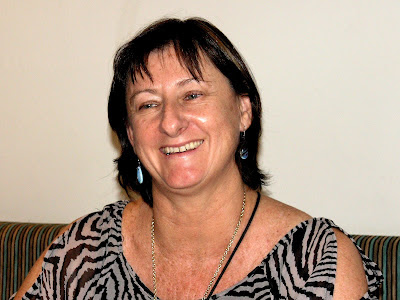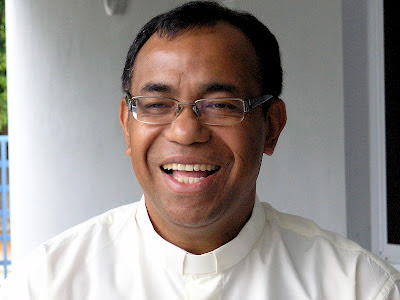
Don't get annoyed - publish
It doesn’t seem to take much to rile Vedi Hadiz. Which is strange because he’s not a gouty Dr
Grumps railing impotently against real or imagined wrongs.
In fact the Professor of Asian Studies and Politics at
Western Australia’s Murdoch University is a relaxed and funny iconoclast in a
dream job, with many good years and yarns left in his nimble 48 year old brain.
It’s just that he gets mightily upset about sloppy reporting, shallow thinking and easy assumptions about Indonesia. Particularly when these come from ‘security experts’ whose facile pronouncements get picked up in the media, recycled by politicians and used to mould policy.
(In this swipe he excluded the International Crisis Group’s Jakarta analyst Sidney Jones.)
“A sense of being annoyed is a great incentive for research,” he said “I’m pissed-off by simplistic ideas, like decentralisation equals democracy which leads to good governance and good civil society.
“That’s naive and misleading. In fact decentralization has provided a lifeline for the old elites who’ve continued their predatory political behaviour, assembling private wealth through control of public resources.
“I get annoyed by the rants of people with no knowledge of Islamic politics who claim terrorism equals chaos and who think (the jailed firebrand cleric) Abu Bakar Bashir runs Indonesia.
“In fact the radical Islamists have found politics and bombs don’t work so they’re going back to proselytizing and dakwah (the preaching of Islam).”
Professor Hadiz hasn’t voted in the new democracy because “the presidential field has been so pathetic”.
He doesn’t expect either his position or the offerings to change in the 2014 elections. The same faces are still in charge, though this time their platforms are festooned with democracy
bunting.
For President Susilo Bambang Yudhoyono (SBY) Professor Hadiz reserves special disgust, particularly for not standing up to the “thugs” in the Front Pembela Islam (FPI – Islamic Defenders’ Front) who have terrorised those it considers deviants and heretics.
“SBY is afraid of everything under the sun,” he said. “He’s afraid of (political party) Golkar, (Golkar chair) Aburizal Bakrie, his fellow generals, Islamic radicals and people in his own party.
He claims he doesn’t have the power to fix some problems, but he’s more gutless than powerless.”
Professor Hadiz’s comments aren’t the soundings of an empty vessel. He’s also a Future Fellow of the Australian Research Council, an honor not given to blowhards
Professor Hadiz’s comments aren’t the soundings of an empty vessel. He’s also a Future Fellow of the Australian Research Council, an honor not given to blowhards
The son of a diplomat whose family was originally from Bukittinggi he spent time as a child in the US and UK. In Britain he developed a taste for soccer and Earl Grey tea. He also tweaked his vowels into a fine English accent, now laced with Aussie slang, smothering his Jakarta origins and University of Indonesia education.
This was during the authoritarian rule of President Soeharto that banned liberal pronouncements and unauthorized books. The first obstacle was overcome at home where the family of parents plus five (he was number four) discussed local and world affairs, underpinned by Western publications smuggled into the Republic.
He found UI “politically staid” and run by fearful old men. He became an activist in the danger days. “Most of what I learned was from outside the university,” Professor Hadiz said. “I didn’t want to follow my father into the bureaucracy.
“Some of my writing was so heavily censored I couldn’t understand what I was supposed to be saying. “Every time I came back to Soekarno-Hatta I feared Immigration would pull me aside. Not now. Instead it happens in Europe and the US because I travel on an Indonesian passport.”
On graduating he moved to Murdoch as a doctoral student, attracted by the high quality work being undertaken at the Asian Research Centre. After a few years he returned to Indonesia with a
PhD expecting academic accolades. Instead his homeland universities turned their backs on their high-achieving son.
Maybe they were still edgy – Soeharto had gone but not his acolytes. Employing a lecturer infected by the Western tradition of academics speaking their minds might stir students are rupture routines.
Indonesia’s loss – neighbor’s gain. For the next ten years he worked as an associate professor in Singapore’s National University Depa rtment of Sociology. Two years ago he moved back to Murdoch to research State, class and Islamic populism.
His latest book is Localising Power in Post-Authoritarian Indonesia: A Southeast Asia Perspective.
Soon he’ll fly to Cairo to swap ideas with fellow scholars on the development of Islamic parties since the fall of President Hosni Mubarak. He’s undertaken similar research in Turkey.
Not speaking Arabic and being a “KTP (ID card) Muslim who drinks beer and wine” isn’t a handicap. His Middle Eastern name flags red at US border controls but in the Nile Valley it’s a credibility passport for field trips.
Recently he’s looked at Egypt’s Muslim Brotherhood and Turkey’s AKP (Justice and Development Party). He’s compared these with Indonesia’s Islamic Partai Keadilan Sejahtera (PKS), the Justice
and Prosperity Party.
Professor Hadiz believes that unlike the AKP the PKS is in decline, unable to develop broad support. “It’s in a bind,” he said. “It doesn’t have access to big funds, which in Indonesia are
controlled by the Chinese bourgeoisie.
“It can’t get to the regions through charity work because (the Islamic organizations) Muhammadiyah and Nahdlatul Ulama dominate. If it seeks public appeal as an open party its Islamic colors will fade.
“Intellectually it’s important for scholars to get away from a Southeast Asian focus. I find comparative studies theoretically enriching, useful in understanding what’s happening in Indonesia. For example, unlike others I never bought the euphoria of 1998.
“Nor do I accept all economic boom claims. There’s a mega black economy
involved in smuggling, deforestation, gambling and drugs that never features in
the official GDP statistics. We’ve had growth without investment – so where did the money come from?
“People say I’m a pessimist. I can’t understand that. I’m not disillusioned with Indonesian democracy – this is the way I expected it to go. Yet with all its faults I still prefer this
to the New Order.”
(First published in The Jakarta Post 21 February 2012)
##
##


